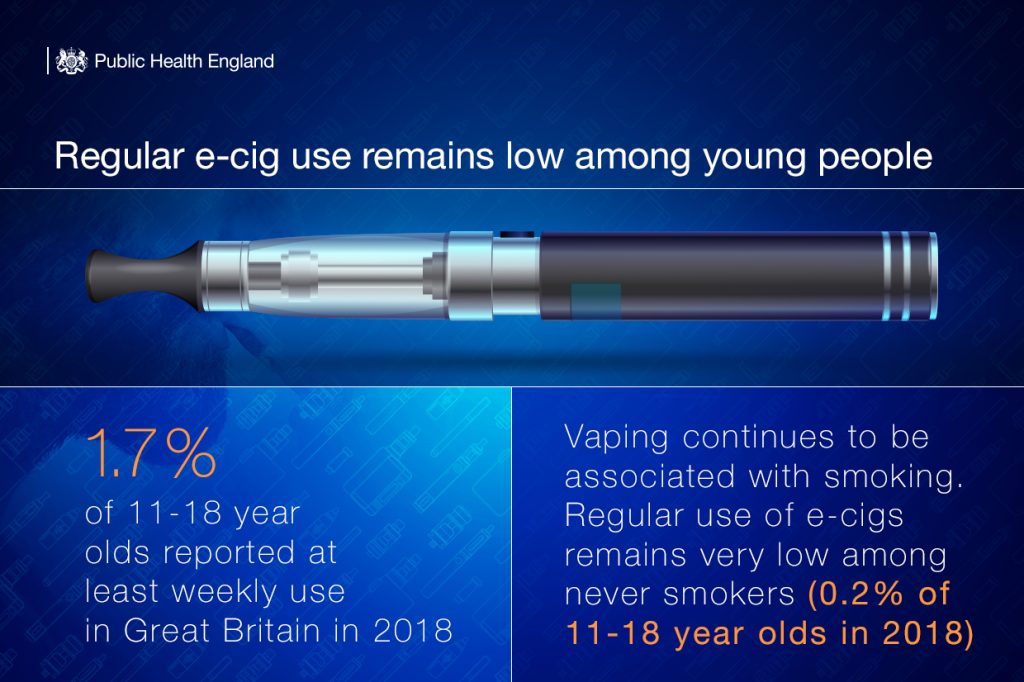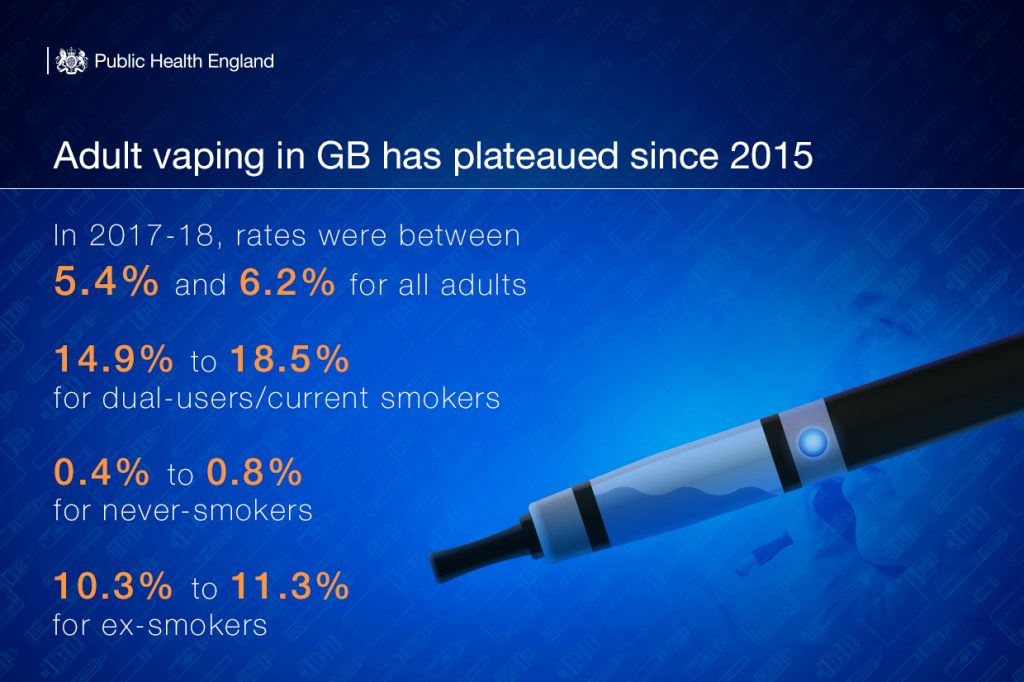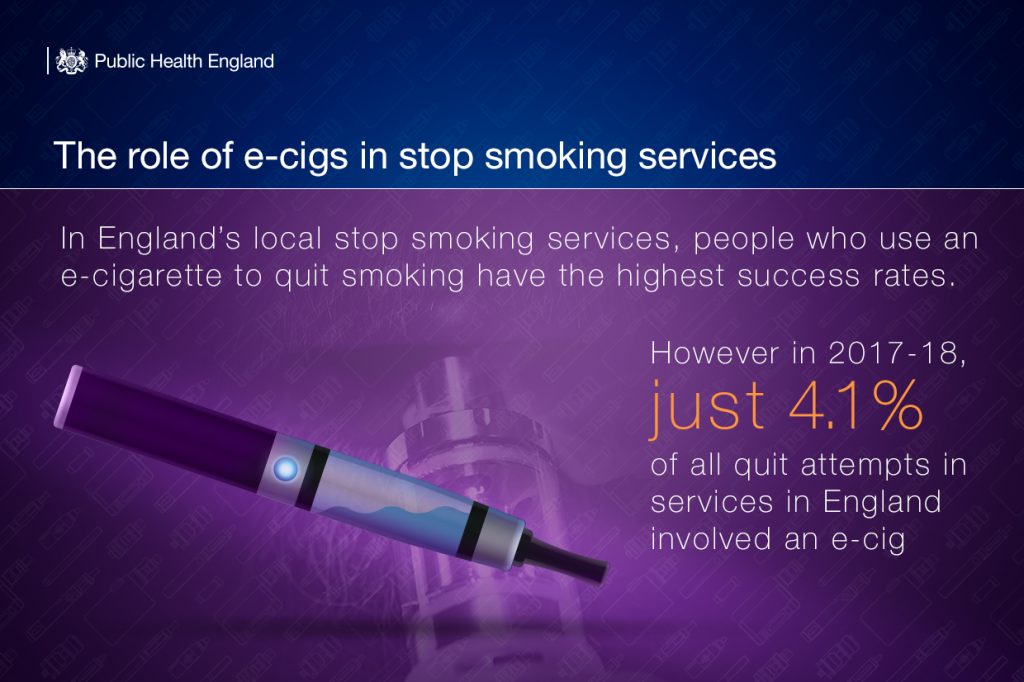
This post was published when Public Health England had responsibility for health advice relating to e-cigarettes. For the most recent information please visit the NHS website or search for the topic on the gov.uk website.
Smoking prevalence is at an all-time low in England, but over six million people are still smoking. The recently published NHS Long Term Plan hails prevention as a way to save over 500,000 lives across the next ten years, and helping smokers to quit is a key part of the plan.
There are 2.5 million e-cigarette users across the country and we’re used to seeing people vaping. As popularity has increased over the past ten years, so too have discussions about their safety and how effective they are for quitting smoking.
In brief, they are not completely risk free, but vaping is far less harmful than smoking – a view supported by many including the Royal College of Physicians, Cancer Research UK and the US National Academy of Sciences. Growing evidence also suggests that using an e-cigarette can be one of the most effective ways to quit.
You can get the facts on some of the most common myths about e-cigarettes in our blog.
PHE has just published the latest update to our evidence on e-cigarettes, providing important context for discussions about their role in smoking cessation. The latest in a series of reports commissioned under the Tobacco Control Plan, this edition looks specifically at patterns of use among adults and young people.
The report shows that regular e-cigarette use has plateaued over recent years and highlights some of the opportunities for Stop Smoking Services in particular to encourage more smokers to switch to vaping.
The key points from the latest update are:
The great majority of vapers are current or ex-smokers
The evidence shows that e-cigarette use remains largely confined to those who already smoke or ex-smokers, who have now quit using an e-cigarette, while quitting smoking remains the key motivation among adult vapers.
As e-cigarettes have become the quit aid of choice for adult smokers, some have speculated that there will be a surge in young people using them regularly, with particular concern in the US about products such as Juul. But our report shows that this is not happening in Britain. While experimentation is increasing, vaping among young people remains low.

Rising experimentation is unsurprising but the crucial point is that we are not seeing a surge in regular use among young people, which remains low (1.7%) and mainly confined to those who already smoke. Only 0.2% of those who have never smoked are regular e-cigarette users.
Beyond this report, the evidence suggests that vaping helps people stop smoking rather than leading them to start in the first place. The proportion of e-cigarettes users who are ex-smokers has increased over recent years and adult smoking rates continue to decline.
We will continue to monitor the evidence on e-cigarette use extremely closely to ensure that we manage the risks while maximising the public health opportunities they present to help smokers quit for good.
We should be encouraging smokers to switch
Regular e-cigarette use among adults is now plateauing and we know that a third of smokers are yet to try an e-cigarette. There is an opportunity here to further reduce the harms caused by tobacco by encouraging more smokers to try vaping and for ‘dual-users’ to switch completely.

Fewer than one in 20 (4.1%) quit attempts in Stop Smoking Services in England are made using an e-cigarette even though this is an effective approach. Separately to our latest report, a major randomised control study has found that e-cigarettes, when combined with face-to-face support, are up to twice as effective for quitting smoking as other nicotine replacement products such as patches or gum.

Our report recommends that Stop Smoking Services should do more to encourage smokers that want to quit with the help of an e-cigarette. All services, and indeed other healthcare professionals, should encourage smokers who want to quit by switching to vaping.
For the public, our advice remains the same: if you’re not a smoker, don’t start and don’t vape. If you’re a smoker, quit now and consider using an e-cigarette to help you. Remember that using a quit aid along with support from your local stop smoking service gives you the best chance of quitting successfully.
You can read the full evidence update for further information.
You might also be interested in:

4 comments
Comment by Francis Yates posted on
You are condoning "vaping" in public areas i.e. pubs and clubs etc..
"Vapers" (or "Vapists" is it?) should only be allowed to pursue their horrible,vile, smelly habit away from us "normal" people, some of whom have respiratory problems with an aversion to inhaling unnecessary obnoxious fumes.
Hopefully sometime soon in parliament, (I know that they have been busy recently), someone with a modicum of sense will realise that the NHS will be greatly assisted by banning "vaping" in public enclosed places, so that people like me, who at the minute, despite a long standing respiratory condition, don't burden our local health service by visiting the GP with ills directly attributable to being subjected to "vaping" fumes!
Comment by Chris Luke posted on
Without Vaping we would have nearly 3 million more smokers in the UK. What sense would it make to ban vaping which would only serve the purpose of seeing smoking prevalence rise once more. Smoking rates are at an all time low and would be much lower without ill informed opinions about vaping. Tobacco contains a cocktail of lethal chemicals that cause illness, cancers and premature deaths. As an ex smoker and now a vaper I can say that my health has never been better. No more shortness of breath, nasty coughs or days away from work due to smoking related problems. I only wish that more smokers would make the switch and feel the benefits for themselves rather than listening to tabloid fodder.
Comment by Francis Yates posted on
Please reread my post. I am objecting to "vaping" in public enclosed places,e.g. public houses, buses, trains etc.!
Comment by David Wooff posted on
You obviously haven't a clue what you are talking about. I suffer from an immediate "allergic" reaction to the smell of vape in the office where I work and that is just from people walking back in from outside having been out for a smoking break. I don't and never have had any allergies to anything else.